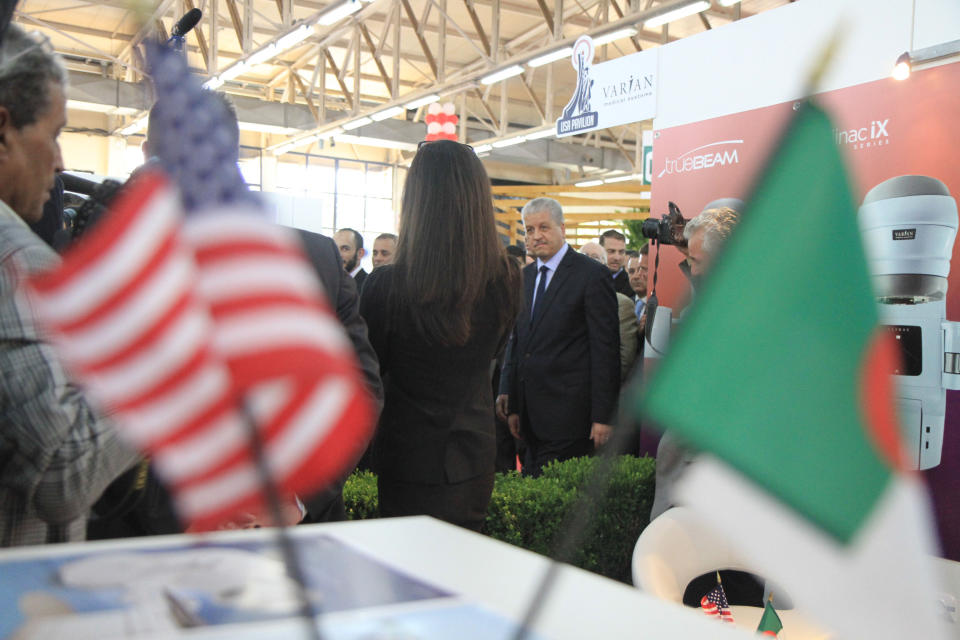 ALGIERS, Algeria (AP) — With its oil riches a decade past their peak, Algeria is under pressure to overhaul and open its economy. But a new plan to attract foreign investment faces an uphill battle in a country that has a business environment described as one of the most hostile in the world.
ALGIERS, Algeria (AP) — With its oil riches a decade past their peak, Algeria is under pressure to overhaul and open its economy. But a new plan to attract foreign investment faces an uphill battle in a country that has a business environment described as one of the most hostile in the world.
Prime Minister Abdelmalek Sellal said over the weekend that the government intends to encourage more foreign interest in the underperforming agriculture, industry and tourism sectors. Algeria still has a positive balance of trade and foreign reserves of $190 billion, but its energy production has been in decline since 2005 and analysts warn the country, which imports nearly everything, will eventually run out of money if it doesn't change its ways.
The list of challenges, however, is long: impenetrable bureaucracy, vested interests, difficulty to repatriate profits, poor enforcement of intellectual property rights and onerous customs procedures.
"Algeria has historically been one of the hardest places in the region to do business," said Doug Wallace, the U.S. commercial attaché for North Africa. He ticked off a string of protectionist laws and measures that make investing in Algeria difficult, chief among them a 2009 law requiring Algerian companies own 51 percent of any venture.
The United States, which limits its investments in the country almost entirely to the oil and gas sector, is the guest of honor at the Algiers International Trade fair that concludes Monday and Wallace hopes the countries' improving relations will help the investment environment.
"Let's get some small and medium size U.S. companies in Algeria," he said. "There's nothing to say that Algeria can't do what Morocco has done."
While neighbors Morocco and Algeria have roughly the same amount of foreign investment, Algeria's is largely in the oil sector, which creates few jobs.
Algeria's unemployment rate is nearly 10 percent — 25 percent for young people. Crucially, some 60 percent of jobs come from the government. Until now, Algeria has quieted its restive population by handing out jobs and housing, but if there are no new oil finds soon, it will need to see about employing them.
 According to economist Abdelhak Lamiri, at Algiers-based International Management Institute, there are only 680,000 companies in this country of 38 million when comparably sized countries have at least 1.5 million.
According to economist Abdelhak Lamiri, at Algiers-based International Management Institute, there are only 680,000 companies in this country of 38 million when comparably sized countries have at least 1.5 million.
The whole business environment is geared toward importing products rather than producing them locally, he explained. That's partly because it's easier than starting up local businesses and industries, and because the government's oil revenue can afford it — so far.
"They can continue like this as long as there are petroleum receipts and the day the resources start shrinking they will have to change the political economy and start creating companies," said Lamiri.
The World Bank's Doing Business 2014, a report that rates the investment environment in 189 countries, ranks Algeria a dismal 153 — the worst in the region.
According to the report, for example, it takes 14 separate procedures to start a business in Algeria, compared to just eight in the rest of the region. Registering a property, meanwhile, takes 10 procedures and 63 days, compared to the Middle East average of six procedures over 33 days.
For international investors, the experience of the Egyptian telecommunications company Orascom Telecom, which took a stake in local mobile phone service network Djezzy in 2009, was especially chilling.
Following the dramatic deterioration in relations between Algeria and Egypt over violence during World Cup qualifying matches, Algiers presented Orascom with an unexpected $600 million tax bill.
The Algerian government later blocked the sale of Djezzy to a South African investor and then prevented Orascom from importing new equipment or repatriating its dividends. The affair was eventually resolved through a Russian buyer but Orascom declared a loss of more than $2 billion in 2014.
 While the byzantine bureaucracy has always made investment difficult, the country's most restrictive investment laws date from that affair and according to Riccardo Fabiani, North Africa analyst with the Eurasia Group, the new effort to attract investment must involve a relaxing of some of them.
While the byzantine bureaucracy has always made investment difficult, the country's most restrictive investment laws date from that affair and according to Riccardo Fabiani, North Africa analyst with the Eurasia Group, the new effort to attract investment must involve a relaxing of some of them.
Foreign investors, however, will continue to remain leery of any sudden shifts in the investment laws, such as happened after the Orascom affair.
"Even if the authorities were to introduce a shock therapy, which is unlikely to happen, as there are too many constituencies and vested interests that benefit from the economy being so closed to foreign investors," said Fabiani. "It would take time to convince foreign investors that these rules will not change again in a few years."
Source: AP
No comments:
Post a Comment